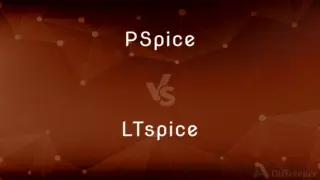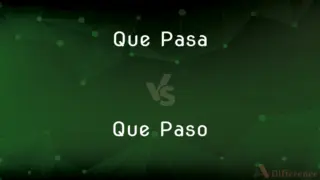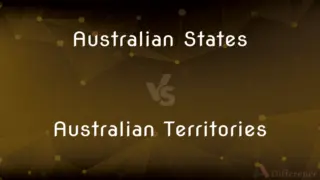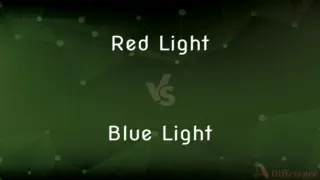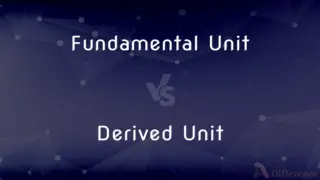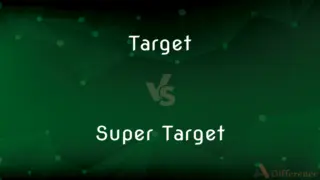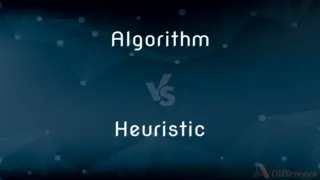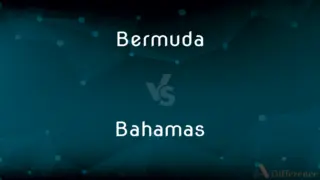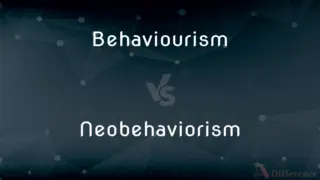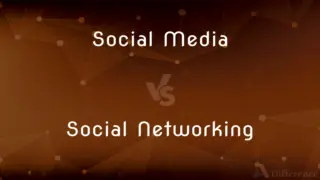Ocean vs. Gulf — What's the Difference?
Edited by Tayyaba Rehman — By Urooj Arif — Updated on May 8, 2024
An ocean is a vast body of saltwater that covers a significant portion of the Earth's surface, whereas a gulf is a smaller body of saltwater, partially enclosed by land, that connects to an ocean or sea.

Difference Between Ocean and Gulf
Table of Contents
ADVERTISEMENT
Key Differences
An ocean is one of the world's largest saltwater expanses, covering over 70% of Earth's surface. A gulf, on the other hand, is smaller and partially surrounded by land but remains connected to the ocean.
Oceans serve as the primary reservoir of Earth's water, influencing global climate patterns and currents. Gulfs, however, often host more localized ecosystems and serve as significant commercial or cultural regions.
Oceans are divided into five major areas (Atlantic, Pacific, Indian, Arctic, and Southern), each with its unique characteristics. Gulfs are typically named after the surrounding regions, such as the Gulf of Mexico or the Persian Gulf.
Oceans generally have consistent salinity levels due to their size and circulation. In contrast, a gulf's enclosed nature may lead to distinct variations in salinity, temperature, and marine life.
Oceans are less affected by regional pollution due to their vastness. Gulfs can be more susceptible to environmental issues due to their smaller size and proximity to land-based activities.
ADVERTISEMENT
Comparison Chart
Definition
Vast, continuous body of saltwater
Smaller, semi-enclosed saltwater body
Surrounding
Open, often bordering continents
Partially enclosed by land
Size
Largest water bodies on Earth
Smaller and region-specific
Salinity
More consistent due to circulation
Variable, influenced by surrounding land
Marine Life
Diverse and varied
Often unique and more localized
Compare with Definitions
Ocean
Any of the five principal geographical divisions of the world ocean.
The Atlantic Ocean separates North America from Europe and Africa.
Gulf
A significant difference or gap between two entities.
There's a gulf between theory and practice in this field.
Ocean
The entire body of saltwater on Earth.
Scientists study the ocean's role in climate change.
Gulf
A metaphorical divide in understanding.
The gulf between generations is becoming more apparent.
Ocean
A vast or seemingly limitless quantity.
There was an ocean of people at the concert.
Gulf
A deep inlet of the sea partly surrounded by land.
The Gulf of Mexico is famous for its diverse marine life.
Ocean
A large body of saltwater that covers Earth's surface.
The Pacific Ocean is the largest and deepest ocean in the world.
Gulf
A large difference in beliefs or ideas.
The gulf between their political views is immense.
Ocean
A metaphor for something immense.
He has an ocean of patience when dealing with children.
Gulf
A body of saltwater connected to an ocean.
The Persian Gulf is a crucial route for oil shipments.
Ocean
The ocean (also the sea or the world ocean) is the body of salt water which covers approximately 71% of the surface of the Earth and contains 97% of Earth's water. Another definition is "any of the large bodies of water into which the great ocean is divided".
Gulf
A gulf is a large inlet from the ocean into the landmass, typically with a narrower opening than a bay, but that is not observable in all geographic areas so named. The term gulf was traditionally used for large highly-indented navigable bodies of salt water that are enclosed by the coastline.
Ocean
The entire body of salt water that covers more than 70 percent of the earth's surface.
Gulf
Abbr. G. A large area of a sea or ocean partially enclosed by land, especially a long landlocked portion of sea opening through a strait.
Ocean
Abbr. Oc. or O. Any of the principal divisions of the ocean, including the Atlantic, Pacific, Indian, Arctic, and Southern Oceans.
Gulf
A deep, wide chasm; an abyss.
Ocean
A great expanse or amount
"that ocean of land which is Russia" (Henry A. Kissinger).
Gulf
A wide gap, as in understanding
"the gulf between the Victorian sensibility and our own" (Babette Deutsch).
Ocean
(countable) One of the large bodies of water separating the continents.
Gulf
Something, such as a whirlpool, that draws down or engulfs.
Ocean
(uncountable) Water belonging to an ocean.
The island is surrounded by ocean
Gulf
To engulf.
Ocean
(figuratively) An immense expanse; any vast space or quantity without apparent limits.
The boundless ocean of eternity
An ocean of difference
Gulf
A hollow place in the earth; an abyss; a deep chasm or basin.
Ocean
A blue colour, like that of the ocean (also called ocean blue).
Gulf
(obsolete) That which swallows; the gullet.
Ocean
The whole body of salt water which covers more than three fifths of the surface of the globe; - called also the sea, or great sea.
Like the odor of brine from the oceanComes the thought of other years.
Gulf
That which swallows irretrievably; a whirlpool; a sucking eddy.
Ocean
One of the large bodies of water into which the great ocean is regarded as divided, as the Atlantic, Pacific, Indian, Arctic and Antarctic oceans.
Gulf
(geography) A portion of an ocean or sea extending into the land; a partially landlocked sea
The Gulf of Mexico
The Persian Gulf
Ocean
An immense expanse; any vast space or quantity without apparent limits; as, the boundless ocean of eternity; an ocean of affairs.
You're gonna need an oceanOf calamine lotion.
Gulf
(mining) A large deposit of ore in a lode.
Ocean
Of or pertaining to the main or great sea; as, the ocean waves; an ocean stream.
Gulf
(figurative) A wide interval or gap; a separating space.
Ocean
A large body of water constituting a principal part of the hydrosphere
Gulf
(figurative) A difference, especially a large difference, between groups.
Ocean
Anything apparently limitless in quantity or volume
Gulf
(Oxbridge slang) The bottom part of a list of those awarded a degree, for those who have only just passed.
Gulf
To award a degree to somebody who has only just passed sufficiently.
Gulf
A hollow place in the earth; an abyss; a deep chasm or basin,
He then surveyedHell and the gulf between.
Between us and you there is a great gulf fixed.
Gulf
That which swallows; the gullet.
Gulf
That which swallows irretrievably; a whirlpool; a sucking eddy.
A gulf of ruin, swallowing gold.
Gulf
A portion of an ocean or sea extending into the land; a partially land-locked sea; as, the Gulf of Mexico.
Gulf
A large deposit of ore in a lode.
Gulf
An arm of a sea or ocean partly enclosed by land; larger than a bay
Gulf
An unbridgeable disparity (as from a failure of understanding);
He felt a gulf between himself and his former friends
There is a vast disconnect between public opinion and federal policy
Gulf
A deep wide chasm
Common Curiosities
Why do gulfs often have unique ecosystems?
Their partial enclosure by land leads to varied conditions in temperature, salinity, and marine life.
How many oceans are there?
There are five major oceans: Atlantic, Pacific, Indian, Arctic, and Southern.
Which ocean is the smallest?
The Arctic Ocean is the smallest of the five major oceans.
What is an example of a famous gulf?
The Gulf of Mexico is a well-known gulf, crucial for commerce, fishing, and its rich biodiversity.
What's the main difference between an ocean and a gulf?
An ocean is a vast body of saltwater covering Earth's surface, while a gulf is a smaller inlet partially surrounded by land.
Do oceans have a uniform depth?
No, oceans vary significantly in depth, with the Mariana Trench being the deepest known point.
Are gulfs generally saltier than oceans?
Not always, but their partial enclosure can lead to variable salinity levels, sometimes higher or lower than the surrounding ocean.
Are all gulfs connected to oceans?
Yes, gulfs are connected to larger ocean bodies, even if indirectly.
Which ocean is the largest by area?
The Pacific Ocean is the largest, covering more area than all the landmasses combined.
Why are gulfs important for marine transportation?
Gulfs often act as natural harbors, providing protected routes for shipping and commerce connected to the open ocean.
Can gulfs have tides similar to oceans?
Yes, gulfs experience tides, though their patterns can vary due to the unique shape and land surrounding them.
Do gulfs typically have strong currents like oceans?
Generally, gulfs have weaker currents due to their smaller size and partial enclosure by land, unlike the strong global currents found in oceans.
Is there a gulf on every continent?
No, gulfs are not present on every continent, but they are common in coastal regions with unique geographical features.
Do oceans have distinct layers?
Yes, oceans are stratified into layers based on temperature, salinity, and density, influencing oceanic life and currents.
What geological processes form gulfs?
Gulfs often form through tectonic activity, erosion, and rising sea levels that create natural indentations along coastlines.
Share Your Discovery

Previous Comparison
Judge vs. Advocate
Next Comparison
Coelomate vs. PseudocoelomateAuthor Spotlight
Written by
Urooj ArifUrooj is a skilled content writer at Ask Difference, known for her exceptional ability to simplify complex topics into engaging and informative content. With a passion for research and a flair for clear, concise writing, she consistently delivers articles that resonate with our diverse audience.
Edited by
Tayyaba RehmanTayyaba Rehman is a distinguished writer, currently serving as a primary contributor to askdifference.com. As a researcher in semantics and etymology, Tayyaba's passion for the complexity of languages and their distinctions has found a perfect home on the platform. Tayyaba delves into the intricacies of language, distinguishing between commonly confused words and phrases, thereby providing clarity for readers worldwide.



















